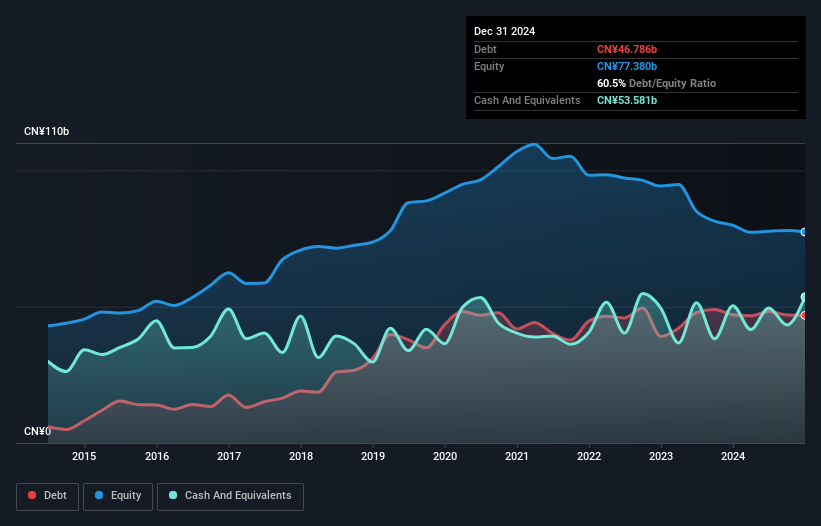
Legendary fund manager Li Lu (who Charlie Munger backed) once said, 'The biggest investment risk is not the volatility of prices, but whether you will suffer a permanent loss of capital.' So it seems the smart money knows that debt - which is usually involved in bankruptcies - is a very important factor, when you assess how risky a company is. As with many other companies Shanghai Electric Group Co., Ltd. (HKG:2727) makes use of debt. But is this debt a concern to shareholders?
Why Does Debt Bring Risk?
Debt and other liabilities become risky for a business when it cannot easily fulfill those obligations, either with free cash flow or by raising capital at an attractive price. Part and parcel of capitalism is the process of 'creative destruction' where failed businesses are mercilessly liquidated by their bankers. However, a more common (but still painful) scenario is that it has to raise new equity capital at a low price, thus permanently diluting shareholders. Of course, debt can be an important tool in businesses, particularly capital heavy businesses. The first thing to do when considering how much debt a business uses is to look at its cash and debt together.
What Is Shanghai Electric Group's Net Debt?
As you can see below, Shanghai Electric Group had CN¥46.8b of debt, at December 2024, which is about the same as the year before. You can click the chart for greater detail. But it also has CN¥53.6b in cash to offset that, meaning it has CN¥6.79b net cash.

How Healthy Is Shanghai Electric Group's Balance Sheet?
The latest balance sheet data shows that Shanghai Electric Group had liabilities of CN¥190.5b due within a year, and liabilities of CN¥34.6b falling due after that. On the other hand, it had cash of CN¥53.6b and CN¥100.4b worth of receivables due within a year. So its liabilities total CN¥71.1b more than the combination of its cash and short-term receivables.
This deficit is considerable relative to its very significant market capitalization of CN¥97.4b, so it does suggest shareholders should keep an eye on Shanghai Electric Group's use of debt. This suggests shareholders would be heavily diluted if the company needed to shore up its balance sheet in a hurry. While it does have liabilities worth noting, Shanghai Electric Group also has more cash than debt, so we're pretty confident it can manage its debt safely.
See our latest analysis for Shanghai Electric Group
Better yet, Shanghai Electric Group grew its EBIT by 143% last year, which is an impressive improvement. That boost will make it even easier to pay down debt going forward. There's no doubt that we learn most about debt from the balance sheet. But ultimately the future profitability of the business will decide if Shanghai Electric Group can strengthen its balance sheet over time. So if you're focused on the future you can check out this free report showing analyst profit forecasts.
But our final consideration is also important, because a company cannot pay debt with paper profits; it needs cold hard cash. While Shanghai Electric Group has net cash on its balance sheet, it's still worth taking a look at its ability to convert earnings before interest and tax (EBIT) to free cash flow, to help us understand how quickly it is building (or eroding) that cash balance. Over the last two years, Shanghai Electric Group actually produced more free cash flow than EBIT. That sort of strong cash conversion gets us as excited as the crowd when the beat drops at a Daft Punk concert.
Summing Up
Although Shanghai Electric Group's balance sheet isn't particularly strong, due to the total liabilities, it is clearly positive to see that it has net cash of CN¥6.79b. The cherry on top was that in converted 355% of that EBIT to free cash flow, bringing in CN¥13b. So we don't think Shanghai Electric Group's use of debt is risky. Above most other metrics, we think its important to track how fast earnings per share is growing, if at all. If you've also come to that realization, you're in luck, because today you can view this interactive graph of Shanghai Electric Group's earnings per share history for free.
When all is said and done, sometimes its easier to focus on companies that don't even need debt. Readers can access a list of growth stocks with zero net debt 100% free, right now.
Have feedback on this article? Concerned about the content? Get in touch with us directly. Alternatively, email editorial-team (at) simplywallst.com.
This article by Simply Wall St is general in nature. We provide commentary based on historical data and analyst forecasts only using an unbiased methodology and our articles are not intended to be financial advice. It does not constitute a recommendation to buy or sell any stock, and does not take account of your objectives, or your financial situation. We aim to bring you long-term focused analysis driven by fundamental data. Note that our analysis may not factor in the latest price-sensitive company announcements or qualitative material. Simply Wall St has no position in any stocks mentioned.